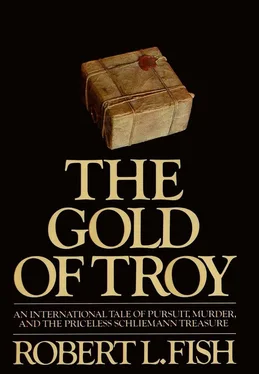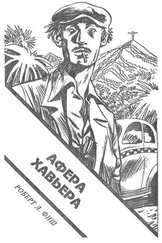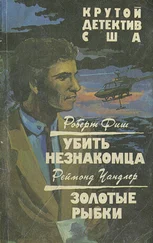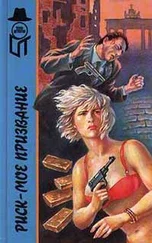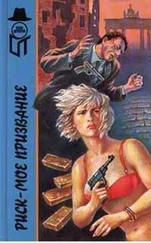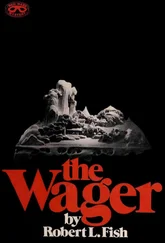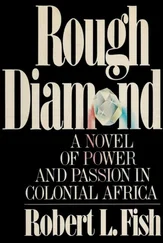“A very reasonable question,” Kovpak said approvingly. He checked the telephone number opposite the address, asked the hotel operator for an outside line, and dialed. He sat waiting stolidly and then suddenly came to life, smiling brightly at the receiver. “Hello? Professor Nordberg? How nice to find you in. My name is Gregor Kovpak, of the Hermitage Museum in Leningrad. What? You have? That’s very kind of you, I’m sure. What? Oh, the reason for my call, Professor, is that on a recent expedition I ran across some bones which investigation proved to be those of a baby dinosaur, and which I am in the process of — You’ve read of it? That’s extremely kind of you to say, Professor, but the truth is it was a lucky accident. No, I’m not being modest. But to get to the reason for my call, Professor; recently I came across a paper of yours in some journal — what? Oh, on history? I mean, on history, of course! It impressed me greatly, and since I find myself in Copenhagen, and also since my experience with the baby dinosaur bones has made me particularly intrigued, more and more, with the subject of history in general, I wonder if — what? Your field is Medieval Danish history? Now you’re the one who is being modest, Professor. I’m sure your knowledge is far more extensive. And I would really like to discuss the age when those tiny bones were first laid down, with someone with your background. I’m sure it could make a great joint paper, if you might be interested. If you could spare me a few moments... Tomorrow morning would be fine. No, no! I’ll come to you! Hotels are so impersonal. I have your address. Nine o’clock? Excellent!”
He hung up and smiled at Ulanov. Ulanov shook his head at the deceit one encountered in one’s fellow man. “You said you’d read one of his papers. How did you know he’d even written one?”
“He’s probably written twenty and had one published,” Kovpak said with a faint smile. “Writing papers keeps professors out of mischief. It also, of course,” he added, thinking about it, “often keeps them out of becoming true scientists.” He glanced at his watch and hurriedly came to his feet. “And now you’ll have to excuse me, Serge. I have to take a quick shower and get into some decent clothes. I have a date.”
And, he said to himself as he closed the door behind Ulanov, if you and Ruth only shared the same room, you could be taking your showers together. Think of the water you’d save... He grinned at the thought and went into the bathroom to start the water.
Mr. James Newkirk had not received the welcome afforded Serge Ulanov by Gregor Kovpak, nor had he expected a great welcome. But James Newkirk knew his duty and fully intended to carry it out, and the fact that the lady who opened the door was frowning at him did not bother him. The lady seemed to be trying to place him in her memory as having seen him before, but then she obviously gave it up as being completely unimportant.
“Yes?” she asked.
“May I come in?”
“Certainly not! What do you want?”
Newkirk reached into his pocket and brought out his wallet, opening it to expose his warrant card. “My name is James Newkirk. I’m with the CIA. I’d like a minute of your time.” He tucked the wallet away and pushed past her into the room. Ruth considered leaving the door open during any interview, but Newkirk had other ideas. He closed the door firmly and motioned toward a chair. “Have a seat, Dr. McVeigh. This may take some time.”
Ruth took a deep breath. She did not appreciate strangers pushing themselves into her room and then closing the door. Still, the warrant card had been quite genuine; her years in Washington had acquainted her with the proper recognizable form of the card. She sat down, not pleased with the interruption. She wanted to take a shower and get dressed for Gregor’s admiration.
“All right,” she said coolly. “What do you want?”
Newkirk sat down opposite her. “Miss — I mean, Dr. McVeigh — what do you know of this man you’ve been traveling with — this Gregor Kovpak?” He raised his hand quickly. “I know his scientific qualifications, his reputation as an archaeologist, but what do you know of him?”
This was an easy question to answer. “What business is that of yours?”
“America is my business, Dr. McVeigh, and your business as well, I assume.” Newkirk was proud of the phrase. He truly had a way with words and properly recognized it. He reminded himself to be sure to include the phrase in his report on this conversation, which unfortunately would have to be remembered since Wilson at Langley had never replaced his lost tape recorder. “Or at least I will assume that America is your business until you give me reason not to believe it.”
Ruth felt her temper rising. “Are you suggesting—?”
Newkirk shrugged delicately. “I’m suggesting nothing, Doctor. The fact is that you are an American citizen traveling with a Russian national. We would like to know the reason for this — well, some might call it a possible treasonable act on your part.”
Ruth suddenly decided she had had enough of this. “Mr. Newkirk, do you have a warrant for my arrest?”
Newkirk smiled coldly, but inside he was triumphant. The woman was losing her temper and that was always good. When people lost their tempers they often said things better left unsaid for their own advantage. “Why, Dr. McVeigh? Do you feel you deserve to be arrested?”
“I feel... I feel you should be put away!” Ruth said, fuming, and came to her feet. “Get out!”
Newkirk was not in the least disturbed. He felt he was finally getting somewhere. An interview of this nature might have saved him a good deal of time had he conducted it earlier. It also might have saved him several days in an East German cell, not to mention several severe reprimands from Langley.
“Dr. McVeigh,” he said quietly, “I am from the CIA and you are, ostensibly, an American. I can have you brought to the American Embassy here in Copenhagen on the suspicion that you are dealing with the enemy, and continue the questioning there, if you prefer.” She was glaring at him, speechless. She’ll reveal something soon, Newkirk thought with satisfaction. She’s about to break! And she has no idea my threat is completely idle, that I have no authority in Denmark to take her to the American Embassy or anywhere else. He looked at her, his eye, he was sure, properly stern. “Well, Doctor?”
Ruth McVeigh forcibly brought herself under control, her memory beginning to work. She stared at the man with narrowed eyes and then nodded. “Mr. Newkirk, weren’t you at that conference in London? At the press table?”
“Exactly.” Newkirk nodded. “I represented the Herald Tribune , Paris edition. As cultural reporter.”
“And now you’re representing the CIA?”
“Precisely. Actually, I represent both.”
Ruth sat down again, a move Newkirk interpreted as victory for his side as he waited for her to confess everything. She contemplated him for several moments, her mind finally beginning to recover from her blind anger, beginning to properly function. Here she was with the Schliemann treasure practically in her hands, and at this particular moment this person appears, a person who claims to be a reporter in one breath, a CIA man in the next, and then claims to be both. Even if he were truly a newspaperman — which Ruth didn’t believe for a moment — any story he might elicit from her under any guise could be the cause of the Metropolitan losing sole ownership of a treasure which, after all, she alone had discovered. True, Gregor had been along, but he would be the first to admit that she was the one who had insisted the treasure was lost at sea. She was the one who insisted upon visiting Gedser, insisted upon the interview with Knud Christensen. It was her treasure, and Gregor knew it.
Читать дальше
